Immediate-release methylphenidate for attention deficit hyperactivity disorder (ADHD) in adults
- PMID: 33460048
- PMCID: PMC8092481
- DOI: 10.1002/14651858.CD013011.pub2
Immediate-release methylphenidate for attention deficit hyperactivity disorder (ADHD) in adults
Abstract
Background: Attention deficit hyperactivity disorder (ADHD) is characterized by symptoms of inattention or impulsivity or both, and hyperactivity, which affect children, adolescents, and adults. In some countries, methylphenidate is the first option to treat adults with moderate or severe ADHD. However, evidence on the efficacy and adverse events of immediate-release (IR) methylphenidate in the treatment of ADHD in adults is limited and controversial.
Objectives: To evaluate the efficacy and harms (adverse events) of IR methylphenidate for treating ADHD in adults.
Search methods: In January 2020, we searched CENTRAL, MEDLINE, Embase, eight additional databases and three trial registers. We also searched internal reports on the European Medicines Agency and the US Food and Drug Administration websites. We checked citations of included trials to identify additional trials not captured by the electronic searches.
Selection criteria: Randomized controlled trials (RCTs) comparing IR methylphenidate, at any dose, with placebo or other pharmacological interventions (including extended-release formulations of methylphenidate) for ADHD in adults. Primary outcomes comprised changes in the symptoms of ADHD (efficacy) and harms. Secondary outcomes included changes in the clinical impression of severity and improvement, level of functioning, depression, anxiety and quality of life. Outcomes could have been rated by investigators or participants.
Data collection and analysis: Two review authors extracted data independently on the characteristics of the trials, participants, interventions; outcomes and financial conflict of interests. We resolved disagreements by discussion or consulting a third review author. We obtained additional, unpublished information from the authors of one included trial that had reported efficacy data in a graph. We calculated mean differences (MDs) or standardized MDs (SMDs) with 95% confidence intervals (CIs) for continuous data reported on the same or different scales, respectively. We summarized dichotomous variables as risk ratios (RRs) with 95% CI.
Main results: We included 10 trials published between 2001 and 2016 involving 497 adults with ADHD. Three trials were conducted in Europe and one in Argentina; the remaining trials did not report their location. The RCTs compared IR methylphenidate with placebo, an osmotic-release oral system (OROS) of methylphenidate (an extended-release formulation), an extended-release formulation of bupropion, lithium, and Pycnogenol® (maritime pine bark extract). Participants comprised outpatients, inpatients in addiction treatment, and adults willing to attend an intensive outpatient program for cocaine dependence. The duration of the follow-up ranged from 6 to 18 weeks. IR methylphenidate versus placebo We found very low-certainty evidence that, compared with placebo, IR methylphenidate may reduce symptoms of ADHD when measured with investigator-rated scales (MD -20.70, 95% CI -23.97 to -17.43; 1 trial, 146 participants; end scores; Adult ADHD Investigator Symptom Report Scale (AISRS), scored from 0 to 54), but the evidence is uncertain. The effect of IR methylphenidate on ADHD symptoms when measured with participant-rated scales was moderate, but the certainty of the evidence is very low (SMD -0.59, 95% CI -1.25 to 0.06; I2 = 69%; 2 trials, 138 participants; end scores). There is very low-certainty evidence that, compared with placebo, IR methylphenidate may reduce the clinical impression of the severity of ADHD symptoms (MD -0.57, 95% CI -0.85 to -0.28; 2 trials, 139 participants; I2 = 0%; change and end scores; Clinical Global Impression (CGI)-Severity scale (scored from 1 (very much improved) to 7 (very much worse))). There is low-certainty evidence that, compared with placebo, IR methylphenidate may slightly impact the clinical impression of an improvement in symptoms of ADHD (MD -0.94, 95% CI -1.37 to -0.51; 1 trial, 49 participants; end scores; CGI-Improvement scale (scored from 1 (very much improved) to 7 (very much worse))). There is no clear evidence of an effect on anxiety (MD -0.20, 95% CI -4.84 to 4.44; 1 trial, 19 participants; change scores; Hamilton Anxiety Scale (HAM-A; scored from 0 to 56); very low-certainty evidence) or depression (MD 2.80, 95% CI -0.09 to 5.69; 1 trial, 19 participants; change scores; Hamilton Depression Scale (HAM-D; scored from 0 to 52); very low-certainty evidence) in analyses comparing IR methylphenidate with placebo. IR methylphenidate versus lithium Compared with lithium, it is uncertain whether IR methylphenidate increases or decreases symptoms of ADHD (MD 0.60, 95% CI -3.11 to 4.31; 1 trial, 46 participants; end scores; Conners' Adult ADHD Rating Scale (scored from 0 to 198); very low-certainty evidence); anxiety (MD -0.80, 95% CI -4.49 to 2.89; 1 trial, 46 participants; end scores; HAM-A; very low-certainty evidence); or depression (MD -1.20, 95% CI -3.81 to 1.41, 1 trial, 46 participants; end scores; HAM-D scale; very low-certainty evidence). None of the included trials assessed participant-rated changes in symptoms of ADHD, or clinical impression of severity or improvement in participants treated with IR methylphenidate compared with lithium. Adverse events were poorly assessed and reported. We rated all trials at high risk of bias due to selective outcome reporting of harms and masking of outcome assessors (failure to blind outcome assessor to measure adverse events). Overall, four trials with 203 participants who received IR methylphenidate and 141 participants who received placebo described the occurrence of harms. The use of IR methylphenidate in these trials increased the risk of gastrointestinal complications (RR 1.96, 95% CI 1.13 to 2.95) and loss of appetite (RR 1.77, 95% CI 1.06 to 2.96). Cardiovascular adverse events were reported inconsistently, preventing a comprehensive analysis. One trial comparing IR methylphenidate to lithium reported five and nine adverse events, respectively. We considered four trials to have notable concerns of vested interests influencing the evidence, and authors from two trials omitted information related to the sources of funding and conflicts of interest.
Authors' conclusions: We found no certain evidence that IR methylphenidate compared with placebo or lithium can reduce symptoms of ADHD in adults (low- and very low-certainty evidence). Adults treated with IR methylphenidate are at increased risk of gastrointestinal and metabolic-related harms compared with placebo. Clinicians should consider whether it is appropriate to prescribe IR methylphenidate, given its limited efficacy and increased risk of harms. Future RCTs should explore the long-term efficacy and risks of IR methylphenidate, and the influence of conflicts of interest on reported effects.
Trial registration: ClinicalTrials.gov NCT00550667.
Copyright © 2021 The Cochrane Collaboration. Published by John Wiley & Sons, Ltd.
Conflict of interest statement
Daniela R Junqueira ‐ none known.
Raissa CF Candido was supported as a Master's degree candidate by the Coordenação de Aperfeiçoamento de Pessoal de Nível Superior (CAPES) Foundation, linked to the Brazilian Ministry of Education.
Cristiane A Menezes de Padua ‐ none known.
Su Golder ‐ none known.
Figures
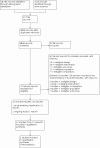
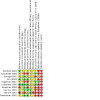
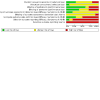
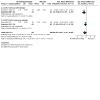



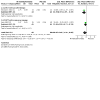
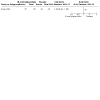
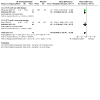






Update of
References
References to studies included in this review
Bouffard 2003 {published data only}
-
- Bouffard R, Hechtman L, Minde K, Iaboni-Kassab F. The efficacy of 2 different dosages of methylphenidate in treating adults with attention-deficit hyperactivity disorder. Canadian Journal of Psychiatry [Revue Canadienne de Psychiatrie] 2003;48(8):546-54. [DOI: 10.1177/070674370304800806] [PMID: ] - DOI - PubMed
Carpentier 2005 {published data only}
Dorrego 2002 {published data only}
-
- Dorrego MF, Canevaro L, Kuzis G, Sabe L, Starkstein SE. A randomized, double-blind, crossover study of methylphenidate and lithium in adults with attention-deficit/hyperactivity disorder: preliminary findings. Journal of Neuropsychiatry and Clinical Neurosciences 2002;14(3):289-95. [DOI: 10.1176/jnp.14.3.289] [PMID: ] - DOI - PubMed
Kooij 2004 {published data only}
-
- Kooij JJ, Burger H, Boonstra AM, Van der Linden PD, Kalma LE, Buitelaar JK. Efficacy and safety of methylphenidate in 45 adults with attention-deficit/hyperactivity disorder. A randomized placebo-controlled double-blind cross-over trial. Psychological Medicine 2004;34(6):973-82. [DOI: 10.1017/s0033291703001776] [PMID: ] - DOI - PubMed
Kuperman 2001 {published data only}
-
- Kuperman S, Perry PJ, Gaffney GR, Lund BC, Bever-Stille KA, Arndt S, et al. Bupropion SR vs methylphenidate vs placebo for attention deficit hyperactivity disorder in adults. Annals of Clinical Psychiatry 2001;13(3):129-34. [PMID: ] - PubMed
Schrantee 2016 {published and unpublished data}
-
- Schrantee A, Tamminga HG, Bouziane C, Bottelier MA, Bron EE, Mutsaerts HJ, et al. Age-dependent effects of methylphenidate on the human dopaminergic system in young vs adult patients with attention-deficit/hyperactivity disorder: a randomized clinical trial. JAMA Psychiatry 2016;73(9):955-62. [DOI: 10.1001/jamapsychiatry.2016.1572] [PMC5267166 ] [PMID: ] - DOI - PMC - PubMed
Schubiner 2002 {published data only}
-
- Schubiner H, Saules KK, Arfken CL, Johanson CE, Schuster CR, Lockhart N, et al. Double-blind placebo-controlled trial of methylphenidate in the treatment of adult ADHD patients with comorbid cocaine dependence. Experimental and Clinical Psychopharmacology 2002;10(3):286-94. [PMID: ] - PubMed
Spencer 2005 {published data only}
-
- Spencer T, Biederman J, Wilens T, Doyle R, Surman C, Prince J, et al. A large, double-blind, randomized clinical trial of methylphenidate in the treatment of adults with attention-deficit/hyperactivity disorder. Biological Psychiatry 2005;57(5):456-63. [DOI: 10.1016/j.biopsych.2004.11.043] [PMID: ] - DOI - PubMed
Spencer 2011 {published data only}
-
- Spencer TJ, Mick E, Surman CB, Hammerness P, Doyle R, Aleardi M, et al. A randomized, single-blind, substitution study of OROS methylphenidate (Concerta) in ADHD adults receiving immediate release methylphenidate. Journal of Attention Disorders 2011;15(4):286-94. [DOI: 10.1177/1087054710367880] [PMID: ] - DOI - PubMed
Tenenbaum 2002 {published data only}
References to studies excluded from this review
Bouziane 2019 {published data only}
-
- Bouziane C, Filatova OG, Schrantee A, Caan MW, Vos FM, Reneman L. White matter by diffusion MRI following methylphenidate treatment: a randomized control trial in males with attention-deficit/hyperactivity disorder. Radiology 2019;293(1):186-92. [DOI: 10.1148/radiol.2019182528] [PMID: ] - DOI - PubMed
Emilsson 2011 {published data only}
-
- Emilsson B, Gudjonsson G, Sigurdsson JF, Baldursson G, Einarsson E, Olafsdottir H, et al. Cognitive behaviour therapy in medication-treated adults with ADHD and persistent symptoms: a randomized controlled trial. BMC Psychiatry 2011;11:116. [DOI: 10.1186/1471-244X-11-116] [PMC3155481] [PMID: ] - DOI - PMC - PubMed
IRCT20090117001556N111 {unpublished data only}
-
- IRCT20090117001556N111. Saffron for attention deficit hyperactivity disorder in adults [Saffron (crocus sativus) for attention deficit hyperactivity disorder in adults: a double blind and placebo controlled trial]. www.who.int/trialsearch/Trial2.aspx?TrialID=IRCT20090117001556N111 (first received 25 July 2018).
Kinsbourne 2001 {published data only}
Mattes 1984 {published data only}
Mick 2006 {published data only}
-
- Mick E, Biederman J, Spencer T, Faraone SV, Sklar P. Absence of association with DAT1 polymorphism and response to methylphenidate in a sample of adults with ADHD. American Journal of Medical Genetics. Part B. Neuropsychiatric Genetics 2006;141B(8):890-4. [DOI: 10.1002/ajmg.b.30376] [PMC2715939] [PMID: ] - DOI - PMC - PubMed
NCT02477280 {published data only}
-
- NCT02477280. Effects of expectation, medication and placebo on objective and self-rated performance [Effects of expectation, medication and placebo on objective and self-rated performance during the Quantified Behavior Test in patients with untreated ADHD and substance use disorder]. clinicaltrials.gov/ct2/show/NCT02477280 (first received 12 June 2015).
Ni 2013 {published data only}
-
- Ni HC, Shang CY, Gau SS, Lin YJ, Huang HC, Yang LK. A head-to-head randomized clinical trial of methylphenidate and atomoxetine treatment for executive function in adults with attention-deficit hyperactivity disorder. International Journal of Neuropsychopharmacology 2013;16(9):1959-73. [DOI: 10.1017/S1461145713000357] [PMID: ] - DOI - PubMed
Ni 2016 {published data only}
-
- Ni H-C, Hwang Gu S-L, Lin H-Y, Lin Y-J, Yan L-K, Huang H-C, et al. Atomoxetine could improve intra-individual variability in drug-naïve adults with attention-deficit/hyperactivity disorder comparably with methylphenidate: a head-to-head randomized clinical trial. Journal of Psychopharmacology 2016;30(5):459-67. [DOI: 10.1177/0269881116632377] [PMID: ] - DOI - PubMed
Nikles 2005 {published data only}
Schlander 2011 {published data only}
-
- Schlander M, Philipsen A, Schwarz O. The cost effectiveness of clinically proven treatment strategies for attention-deficit/hyperactivity disorder (ADHD) in adult patients. Value in Health 2011;14(7):A403. [DOI: 10.1016/j.jval.2011.08.933] [Abstract #PIH29] - DOI
Spencer 2004 {published data only}
-
- Spencer T, Biederman J, Eric M, Stephen F. Efficacy in a 6-month trial of methylphenidate in adults with attention-deficit hyperactivity disorder. International Journal of Neuropsychopharmacology 2004;7(Suppl 2):S442-3. [10.1017/S1461145704004547] [Abstract #P02.523]
-
- Spencer T, Biederman J, Mick E, Faraone SV. Efficacy in a 5 month trial of methylphenidate in adults with attention-deficit hyperactivity disorder. European Neuropsychopharmacology 2004;14(Suppl 3):S369. [DOI: 10.1016/S0924-977X(04)80533-9] [Abstract #P.6.029] - DOI
-
- Spencer TJ. Preliminary results of a six month trial of methylphenidate in adults with ADHD. In: The Promise of Science. The Power of Healing. 156th Annual Meeting of the American Psychiatric Association; 2003 May 17 - 22; San Francisco (CA). San Francisco (CA): American Psychiatric Association, 2003:56. [Symposium 54B]
Vansickel 2011 {published data only}
Verster 2008 {published data only}
-
- Verster JC, Bekker EM, De Roos M, Minova A, Eijken EJ, Kooij JJS, et al. Methylphenidate significantly improves driving performance of adults with attention-deficit hyperactivity disorder: a randomized crossover trial. Journal of Psychopharmacology 2008;22(3):230-7. [DOI: 10.1177/0269881107082946] - DOI - PubMed
Wender 2001 {published data only}
-
- Wender PH, Reimherr FW, Marchan B, Czajkowski L, Sanford E. A placebo-controlled, long-term trial of methylphenidate in the treatment of adults with ADHD. In: American Psychiatric Association , editors(s). Mind Meets Brain: Integrating Psychiatry, Psychoanalysis, Neuroscience. American Psychiatric Association 2001 Annual Meeting, Proceedings Summary; 2001 May 5-10; New Orleans (LA). New Orleans (LA), 2001:43. [Abstract #105. Scientifiic and Clinical Report Session 35. Issues in psychopharmacology]
-
- Wender PH. A placebo controlled, long-term trial of methylphenidate in the treatment of adults with ADHD. CENTRAL 2001.
References to studies awaiting assessment
IRCT20110802007202N15 {published data only (unpublished sought but not used)}
-
- IRCT20110802007202N15. Comparison of the effectiveness of methylphenidate and atomoxetine in the treatment of attention deficit hyperactivity disorder in adult patients. apps.who.int/trialsearch/Trial2.aspx?TrialID=IRCT20110802007202N15 (first received 8 November 2018). [en.irct.ir/trial/7635]
References to ongoing studies
EU CTR 2012‐005246‐38 {published data only (unpublished sought but not used)}
-
- EU CTR 2012-005246-38. The effects of Ritalin treatment on decision making and learning, and on brain activation, in adult ADHD [The effects of methylphenidate on brain processes for decision making in adult attention deficit hyperactivity disorder]. www.clinicaltrialsregister.eu/ctr-search/trial/2012-005246-38/NO (first received 7 February 2013). [EUCTR2012-005246-38-NO]
Additional references
Agnew‐Blais 2016
-
- Agnew-Blais JC, Polanczyk GV, Danese A, Wertz J, Moffitt TE, Arseneault L. Evaluation of the persistence, remission, and emergence of attention-deficit/hyperactivity disorder in young adulthood. JAMA Psychiatry 2016;73(7):713-20. [DOI: 10.1001/jamapsychiatry.2016.0465] [PMC5475268] [PMID: ] - DOI - PMC - PubMed
APA 1980
-
- American Psychiatric Association. Diagnostic and Statistical Manual of Mental Disorders (DSM-III). 3rd edition. Washington (DC): American Psychiatric Association, 1980.
APA 1987
-
- American Psychiatric Association. Diagnostic and Statistical Manual of Mental Disorders (DSM-III-R). 3rd edition. Washington (DC): American Psychiatric Association, 1987.
APA 1994
-
- American Psychiatric Association. Diagnostic and Statistical Manual of Mental Disorders (DSM-IV). 4th edition. Washington (DC): American Psychiatric Association, 1994.
APA 2013
-
- American Psychiatric Association. Diagnostic and Statistical Manual of Mental Disorders (DSM-5). Washington (DC): American Psychiatric Association, 2013.
APA 2017
-
- American Psychiatric Association. What is ADHD? www.psychiatry.org/patients-families/adhd/what-is-adhd 2017.
Barkley 1990
-
- Barkley RA. Attention Deficit Hyperactivity Disorder: A Handbook for Diagnosis and Treatment. New York (NY): Guilford Press, 1990.
Barkley 1998
-
- Barkley RA, Murphy KR. Attention-Deficit Hyperactivity Disorder: A Clinical Workbook. 2nd edition. New York (NY): Guilford Press, 1998.
Barnes 1998
-
- Barnes DE, Bero LA. Why review articles on the health effects of passive smoking reach different conclusions. JAMA 1998;279(19):1566-70. - PubMed
Bero 2017
Bes‐Rastrollo 2013
-
- Bes-Rastrollo M, Schulze MB, Ruiz-Canela M, Martinez-Gonzalez MA. Financial conflicts of interest and reporting bias regarding the association between sugar-sweetened beverages and weight gain: a systematic review of systematic reviews. PLOS Med 2013;10(12):e1001578; discussion e10015787. [DOI: 10.1371/journal.pmed.1001578] [PMC3876974] [PMID: ] - DOI - PMC - PubMed
Boesen 2017
Boutron 2020
-
- Boutron I, Page MJ, Higgins JP, Altman DG, Lundh A, Hróbjartsson A. Chapter 7: Considering bias and conflicts of interest among the included studies. In: Higgins JP, Thomas J, Chandler J, Cumpston M, Li T, Page MJ, et al (editors). Cochrane Handbook for Systematic Reviews of Interventions version 6.1 (updated September 2020). Cochrane, 2020. Available from www.training.cochrane.org/handbook.
Bradley 1937
-
- Bradley C. The behavior of children receiving benzedrine. American Journal of Psychiatry 1937;94(3):577-85. [DOI: 10.1176/ajp.94.3.577] - DOI
Bushe 2016
-
- Bushe C, Day K, Reed V, Karlsdotter K, Berggren L, Pitcher A, et al. A network meta-analysis of atomoxetine and osmotic release oral system methylphenidate in the treatment of attention-deficit/hyperactivity disorder in adult patients. Journal of Psychopharmacology 2016;30(5):444-58. [DOI: 10.1177/0269881116636105] [PMID: ] - DOI - PubMed
CADDRA 2020
-
- CADDRA - Canadian ADHD Resource Alliance. Canadian ADHD Practice Guidelines. In: CADDRA. 4.1 Edition. Toronto, ON: CADDRA, 2020.
Castells 2011
Castells 2018
Caye 2016
-
- Caye A, Rocha TB, Anselmi L, Murray J, Menezes AM, Barros FC, et al. Attention-deficit hyperactivity disorder trajectories from childhood to young adulthood: evidence from a birth cohort supporting a late-onset syndrome. JAMA Psychiatry 2016;73(7):705-12. [DOI: 10.1001/jamapsychiatry.2016.0383] [PMID: ] - DOI - PubMed
Chan 1983
-
- Chan YP, Swanson JM, Soldin SS, Thiessen JJ, Macleod SM, Logan W. Methylphenidate hydrochloride given with or before breakfast: effects on plasma concentration of methylphenidate and ritalinic acid. Pediatrics 1983;72(1):56-9. [PMID: ] - PubMed
Charach 2011
Charach 2013
Chen 2014
Cheng 2017
-
- Cheng YS, Shyu YC, Lee SY, Yuan SS, Yang CJ, Yang KC, et al. Trends, characteristics, and pharmacotherapy of adults diagnosed with attention-deficit hyperactivity disorder: a nationwide survey in Taiwan. Neuropsychiatric Disease and Treatment 2017;13:643-51. [DOI: 10.2147/NDT.S126438] [PMC5338966] [PMID: ] - DOI - PMC - PubMed
Cipriani 2013
Cohen 1988
-
- Cohen J. Statistical Power Analysis for the Behavioral Sciences. 2nd edition. Hillsdale (NJ): Lawrence Erlbaum Associates: Routledge, 1988.
Cortese 2018
-
- Cortese S, Adamo N, Del Giovane C, Mohr-Jensen C, Hayes AJ, Carucci S, et al. Comparative efficacy and tolerability of medications for attention-deficit hyperactivity disorder in children, adolescents, and adults: a systematic review and network meta-analysis. Lancet. Psychiatry 2018;5(9):727-38. [DOI: 10.1016/S2215-0366(18)30269-4] [PMC6109107] [PMID: ] - DOI - PMC - PubMed
Deeks 2020
-
- Deeks JJ, Higgins JP, Altman DG (editors). Chapter 10: Analysing data and undertaking meta-analyses. In: Higgins JP, Thomas J, Chandler J, Cumpston M, Li T, Page MJ, et al (editors). Cochrane Handbook for Systematic Reviews of Interventions version 6.1 (updated September 2020). Cochrane, 2020. Available from www.training.cochrane.org/handbook.
Dresel 2000
-
- Dresel S, Krause J, Krause KH, LaFougere C, Brinkbäumer K, Kung HF, et al. Attention deficit hyperactivity disorder: binding of [99mTc]-TRODAT-1 to the dopamine transporter before and after methylphenidate treatment. European Journal of Nuclear Medicine 2000;27(10):1518-24. [PMID: ] - PubMed
Dunn 2014
DynaMed Plus 2016
-
- DynaMed Plus. Attention deficit hyperactivity disorder (ADHD) in adults: record number 231898. www.dynamed.com/topics/dmp~AN~T231898/Attention-deficit-hyperactivity-di... (accessed August 30 2016).
Egger 1997
Elbourne 2002
-
- Elbourne DR, Altman DG, Higgins JP, Curtin F, Worthington HV, Vail A. Meta-analyses involving cross-over trials: methodological issues. International Journal of Epidemiology 2002;31(1):140-9. [PMID: ] - PubMed
EMA 2009
-
- European Medicines Agency. Elements recommended for inclusion in summaries of product characteristics for methylphenidate-containing medicinal products authorised for the treatment of ADHD in children aged six years and above and adolescents. www.ema.europa.eu/docs/en_GB/document_library/Referrals_document/Methylp... (accessed 22 January 2018).
EndNote 2017 [Computer program]
-
- EndNote X8. Version 8.2. Philadelphia (PA): Thomson Reuters, 2017.
Engert 2008
Epstein 2013
Fayyad 2017
-
- Fayyad J, Sampson NA, Hwang I, Adamowski T, Aguilar-Gaxiola S, Al-Hamzawi A, et al. The descriptive epidemiology of DSM-IV adult ADHD in the World Health Organization World Mental Health Surveys. Attention Deficit and Hyperactivity Disorders 2017;9(1):47-65. [DOI: 10.1007/s12402-016-0208-3] [ PMC5325787] [PMID: ] - DOI - PMC - PubMed
Franke 2018
-
- Franke B, Michelini G, Asherson P, Banaschewski T, Bilbow A, Buitelaar JK, et al. Live fast, die young? A review on the developmental trajectories of ADHD across the lifespan. European Neuropsychopharmacology 2018;28(10):1059-88. [DOI: 10.1016/j.euroneuro.2018.08.001] [PMC6379245] [PMID: ] - DOI - PMC - PubMed
Fredrikesen 2013
Golder 2011
Greenhill 2001
-
- Greenhill LL, Swanson JM, Vitiello B, Davies M, Clevenger W, Wu M, et al. Impairment and deportment responses to different methylphenidate doses in children with ADHD: the MTA titration trial. Journal of the American Academy of Child and Adolescent Psychiatry 2001;40(2):180-7. [DOI: 10.1097/00004583-200102000-00012] [PMID: ] - DOI - PubMed
Guy 1976
-
- Guy W. 028 CGL: Clinical Global Impressions. In: Guy W, editors(s). ECDEU Assessment Manual for Psychopharmacology. Rockville (MD): US Department of Health, Education, and Welfare; Public Health Service: Alcohol, Drug Abuse, and Mental Health Administration, 1976:217-22. [archive.org/details/ecdeuassessmentm1933guyw/mode/2up]
Hanwella 2011
-
- Hanwella R, Senanayake M, De Silva V. Comparative efficacy and acceptability of methylphenidate and atomoxetine in treatment of attention deficit hyperactivity disorder in children and adolescents: a meta-analysis. BMC Psychiatry 2011;11:176. [DOI: 10.1186/1471-244X-11-176] [PMC3229459] [PMID: ] - PMC - PubMed
Heal 2006
-
- Heal DJ, Pierce DM. Methylphenidate and its isomers: their role in the treatment of attention-deficit hyperactivity disorder using a transdermal delivery system. CNS Drugs 2006;20(9):713-38. [PMID: ] - PubMed
Higgins 2011
-
- Higgins JP, Altman DG, Sterne JAC, editor(s). Chapter 8: Assessing risk of bias in included studies. In: Higgins JP, Green S, editor(s). Cochrane Handbook for Systematic Reviews of Interventions Version 5.1.0 (updated March 2011). The Cochrane Collaboration, 2011. Available from www.handbook.cochrane.org.
Higgins 2020
-
- Higgins JP, Eldridge S, Li T (editors). Chapter 23: Including variants on randomized trials. In: Higgins JP, Thomas J, Chandler J, Cumpston M, Li T, Page MJ, et al (editors). Cochrane Handbook for Systematic Reviews of Interventions version 6.1 (updated September 2020). Cochrane, 2020. Available from www.training.cochrane.org/handbook.
Hofvander 2009
ICH 2016
-
- International Council for Harmonisation of Technical Requirements for Pharmaceuticals for Human Use (ICH). Guideline for Good Clinical Practice E6(R2). www.ich.org/page/efficacy-guidelines (accessed 10 July 2019).
Ioannidis 2009
Jorgensen 2016
-
- Jørgensen L, Paludan-Mlüler AS, Laursen DR, Savović J, Boutron I, Sterne JA, et al. Evaluation of the Cochrane tool for assessing risk of bias in randomized clinical trials: overview of published comments and analysis of user practice in Cochrane and non-Cochrane reviews. Systematic Reviews 2016;5:80. [DOI: 10.1186/s13643-016-0259-8] [PMC4862216] - DOI - PMC - PubMed
Junqueira 2019 [pers comm]
-
- Junqueira DR. Age-dependent effects of methylphenidate on the human dopaminergic system in young vs adult patients with attention-deficit/hyperactivity disorder [personal communication]. Email to: L Reneman 7 July 2019.
Kambeitz 2014
Kessler 2006
-
- Kessler RC, Adler L, Barkley R, Biederman J, Conners CK, Demler O, et al. The prevalence and correlates of adult ADHD in the United States: results from the National Comorbidity Survey Replication. American Journal of Psychiatry 2006;163(4):716–23. [DOI: 10.1176/ajp.2006.163.4.716] [PMC2859678] [PMID: ] - DOI - PMC - PubMed
Kolar 2008
Krogh 2019
-
- Krogh HB, Storebø OJ, Faltinsen E, Todorovac A, Ydedahl-Jensen E, Løgstrup Magnusson F, et al. Methodological advantages and disadvantages of parallel and crossover randomised clinical trials on methylphenidate for attention deficit hyperactivity disorder: a systematic review and meta-analyses. BMJ Open 2019;9(3):e026478. [DOI: 10.1136/bmjopen-2018-026478] [PMC6475340] [PMID: ] - DOI - PMC - PubMed
Liberati 2009
-
- Liberati A, Altman DG, Tetzlaff J, Mulrow C, Götzsche PC, Ioannidis JA, et al. The PRISMA statement for reporting systematic reviews and meta-analyses of studies that evaluate healthcare interventions: explanation and elaboration. BMJ 2009;339:b2700. [DOI: 10.1136/bmj.b2700] [PMC2714672] [PMID: ] - DOI - PMC - PubMed
Loke 2015
López‐López 2018
Lundh 2017a
Lundh 2017b
Maia 2017
-
- Maia CR, Cortese S, Caye A, Deakin TK, Polanczyk GV, Polanczyk CA, et al. Long-term efficacy of methylphenidate immediate-release for the treatment of childhood ADHD: a systematic review and meta-analysis. Journal of Attention Disorders 2017;21(1):3-13. [DOI: 10.1177/1087054714559643] [PMID: ] - DOI - PubMed
Maidment 2003
MedlinePlus 2019
-
- MedlinePlus. Maritime Pine. medlineplus.gov/druginfo/natural/1019.html (accessed 17 December 2019).
Mészáros 2009
Moffitt 2015
-
- Moffitt TE, Houts R, Asherson P, Belsky DW, Corcoran DL, Hammerle M, et al. Is adult ADHD a childhood-onset neurodevelopmental disorder? Evidence from a four-decade longitudinal cohort study. American Journal of Psychiatry 2015;172(10):967–77. [DOI: 10.1176/appi.ajp.2015.14101266] [PMC4591104] [PMID: ] - DOI - PMC - PubMed
Moher 2009
Moher 2015
Moncrieff 2011
-
- Moncrieff J, Timimi S. Critical analysis of the concept of adult attention-deficit hyperactivity disorder. Psychiatrist 2011;35(9):334-8. [DOI: 10.1192/pb.bp.110.033423] - DOI
Muit 2020
NICE 2018
-
- National Institute for Health and Care Excellence. Attention Deficit Hyperactivity Disorder: Diagnosis and Management (NG87); March 2018 (last updated September 2019). www.nice.org.uk/guidance/ng87. - PubMed
NIMH 2016
-
- National Institute of Mental Health. Attention-deficit-hyperactivity disorder. www.nimh.nih.gov/health/topics/attention-deficit-hyperactivity-disorder-... (accessed 18 March 2016).
NIMH 2017
-
- National Institute of Mental Health. Could I have attention-deficit/hyperactivity disorder (ADHD)? www.nimh.nih.gov/health/publications/could-i-have-adhd/index.shtml (accessed 17 May 2017).
NIMH 2020
-
- National Institute of Mental Health. Research Domain Criteria (RDoC). www.nimh.nih.gov/research/research-funded-by-nimh/rdoc/about-rdoc.shtml (accessed 1 October 2020).
Page 2020
-
- Page MJ, Higgins JP, Sterne JA. Chapter 13: Assessing risk of bias due to missing results in a synthesis. In: Higgins JP, Thomas J, Chandler J, Cumpston M, Li T, Page MJ, et al (editors). Cochrane Handbook for Systematic Reviews of Interventions version 6.1 (updated September 2020). Cochrane, 2020. Available from www.training.cochrane.org/handbook.
Pehlivanidis 2020
Perini 2014
Perrie 2012
-
- Perrie Y, Rades T. Pharmaceutics - Drug Delivery and Targeting. 2nd edition. London (UK): Pharmaceutical Press, 2012.
Peterson 2008
Polanczyk 2007
Polanczyk 2014
Punja 2013
Punja 2016
-
- Punja S, Shamseer L, Hartling L, Urichuk L, Vandermeer B, Nikles J, et al. Amphetamines for attention deficit hyperactivity disorder (ADHD) in children and adolescents. Cochrane Database of Systematic Reviews 2016, Issue 2. Art. No: CD009996. [DOI: 10.1002/14651858.CD009996.pub2] [PMID: ] - DOI - PMC - PubMed
Reichow 2013
-
- Reichow B, Volkmar FR, Bloch MH. Systematic review and meta-analysis of pharmacological treatment of the symptoms of attention-deficit/hyperactivity disorder in children with pervasive developmental disorders. Journal of Autism and Developmental Disorders 2013;43(10):2435–41. [DOI: 10.1007/s10803-013-1793-z] [PMC3787525] [PMID: 23468071] - DOI - PMC - PubMed
Saini 2014
Schabram 2014
-
- Schabram I, Henkel K, Mohammadkhani SS, Dietrich C, Schmaljohann J, Winz O, et al. Acute and sustained effects of methylphenidate on cognition and presynaptic dopamine metabolism: an [18F]FDOPA PET study. Journal of Neuroscience 2014;34(44):14769-76. [DOI: 10.1523/JNEUROSCI.1560-14.2014] [PMC6608425] [PMID: ] - DOI - PMC - PubMed
Schroll 2016
Schünemann 2020a
-
- Schünemann HJ, Higgins JP, Vist GE, Glasziou P, Akl EA, Skoetz N, et al. Chapter 14: Completing ‘Summary of findings’ tables and grading the certainty of the evidence. In: Higgins JP, Thomas J, Chandler J, Cumpston M, Li T, Page MJ, et al (editors). Cochrane Handbook for Systematic Reviews of Interventions version 6.1 (updated September 2020). Cochrane, 2020. Available from www.training.cochrane.org/handbook.
Schünemann 2020b
-
- Schünemann HJ, Vist GE, Higgins JP, Santesso N, Deeks JJ, Glasziou P, et al. Chapter 15: Interpreting results and drawing conclusions. In: Higgins JP, Thomas J, Chandler J, Cumpston M, Li T, Page MJ, et al (editors). Cochrane Handbook for Systematic Reviews of Interventions version 6.1 (updated September 2020). Cochrane, 2020. Available from www.training.cochrane.org/handbook..
Sibley 2016
Skevington 2004
-
- Skevington SM, Lotfy M, O'Connell KA, WHOQOL Group. The World Health Organization's WHOQOL-BREF quality of life assessment: psychometric properties and results of the international field trial. A report from the WHOQOL group. Quality of Life Research 2004;13(2):299-310. [DOI: 10.1023/B:QURE.0000018486.91360.00] [PMID: 15085902 ] - DOI - PubMed
Somkuwar 2015
-
- Somkuwar SS, Kantak KM, Dwoskin LP. Effect of methylphenidate treatment during adolescence on norepinephrine transporter function in orbitofrontal cortex in a rat model of attention deficit hyperactivity disorder. Journal of Neuroscience Methods 2015;252:55-63. [DOI: 10.1016/j.jneumeth.2015.02.002] [PMC4522381] [PMID: ] - DOI - PMC - PubMed
Spencer 1995
-
- Spencer T, Wilens T, Biederman J, Faraone SV, Ablon JS, Lapey K. A double-blind, crossover comparison of methylphenidate and placebo in adults with childhood-onset attention-deficit hyperactivity disorder. Archives of General Psychiatry 1995;52(6):434-43. [PMID: ] - PubMed
Stein 1996
-
- Stein MA, Blondis TA, Schnitzler ER, O'Brien T, Fishkin J, Blackwell B, et al. Methylphenidate dosing: twice daily versus three times daily. Pediatrics 1996;98(4 Pt 1):748-56. [PMID: ] - PubMed
Storebø 2015
-
- Storebø OJ, Ramstad E, Krogh HB, Nilausen TD, Skoog M, Holmskov M, et al. Methylphenidate for children and adolescents with attention deficit hyperactivity disorder (ADHD). Cochrane Database of Systematic Reviews 2015, Issue 11. Art. No: CD009885. [DOI: 10.1002/14651858.CD009885.pub2] - DOI - PMC - PubMed
Sweetman 2014
-
- Sweetman SC, editor(s). Martindale: The Complete Drug Reference. 38 edition. London (UK): Pharmaceutical Press, 2014. [ISBN 9780857111395 0857111396]
Takeshima 2014
-
- Takeshima N, Sozu T, Tajika A, Ogawa Y, Hayasaka Y, Furukawa TA. Which is more generalizable, powerful and interpretable in meta-analyses, mean difference or standardized mean difference? BMC Medical Research Methodology 2014;14(1):30. [DOI: 10.1186/1471-2288-14-30] [PMC3936842] [PMID: ] - DOI - PMC - PubMed
Thomas 2015
Urion 2020
-
- Urion DK. Attention-deficit/hyperactivity disorder. In: Kliegman RM, St Geme III JW, Blum NJ, Shah SS, Tasker RC, Wilson KM, et al, editors(s). Nelson Textbook of Pediatrics. 21st edition. Vol. 2. Philadelphia (PA): Elsevier, 2020:262-6.e1.
US FDA 2007
-
- United States Food and Drug Administration. FDA directs ADHD drug manufacturers to notify patients about cardiovascular adverse events and psychiatric adverse events. tinyurl.com/yxltwhwy (accessed 22 January 2018).
Ustun 2017
-
- Ustun B, Adler LA, Rudin C, Faraone SV, Spencer TJ, Berglund P, et al. The World Health Organization Adult Attention-Deficit Hyperactivity Disorder Self-report Screening Scale for DSM-5. JAMA Psychiatry 2017;74(5):520-6. [DOI: 10.1001/jamapsychiatry.2017.0298] [PMC5470397] [PMID: ] - DOI - PMC - PubMed
Volkow 2001
-
- Volkow ND, Wang G, Fowler JS, Logan J, Gerasimov M, Maynard L, et al. Therapeutic doses of oral methylphenidate significantly increase extracellular dopamine in the human brain. Journal of Neuroscience 2001;21(2):RC121. [DOI: 10.1523/JNEUROSCI.21-02-j0001.2001] [PMC6763805] [PMID: ] - DOI - PMC - PubMed
Volkow 2002
-
- Volkow ND, Fowler JS, Wang G, Ding Y, Gatley SJ. Mechanism of action of methylphenidate: insights from PET imaging studies. Journal of Attention Disorders 2002;6(Suppl 1):S31-43. [PMID: ] - PubMed
Wakefield 2016
Ware 1996
Wargin 1983
-
- Wargin W, Patrick K, Kilts C, Gualtieri CT, Ellington K, Mueller RA, et al. Pharmacokinetics of methylphenidate in man, rat and monkey. Journal of Pharmacology and Experimental Therapeutics 1983;226(2):382−86. [PMID: ] - PubMed
WHO 1992
-
- World Health Organization. The ICD-10 Classification of Mental and Behavioural Disorders: Clinical Descriptions and Diagnostic Guidelines. Geneva (CH): World Health Organization, 1992.
WHO 2017
-
- WHO Collaborating Centre for Drug Statistic Methodology. ATC/DDD Index 2020. www.whocc.no/atcddd (accessed 31 October 2020).
WHO 2018
-
- World Health Organization. ICD-11: International Classification of Diseases for Mortality and Morbidity Statistics, Eleventh Revision. Geneva (CH): WHO, 2018.
Wigal 2010
-
- Wigal T, Brams M, Gasior M, Gao J, Squires L, Giblin J, et al. Randomized, double-blind, placebo-controlled, crossover study of the efficacy and safety of lisdexamfetamine dimesylate in adults with attention-deficit/hyperactivity disorder: novel findings using a simulated adult workplace environment design. Behavioral and Brain Functions 2010;6(1):34. [DOI: 10.1186/1744-9081-6-34] [PMC2908054] [PMID: ] - DOI - PMC - PubMed
Wilens 2003
Wolraich 2019
-
- Wolraich ML, Hagan JF Jr, Allan C, Chan E, Davison D, Earls M, et al. Clinical practice guideline for the diagnosis, evaluation, and treatment of attention-deficit/hyperactivity disorder in children and adolescents. Pediatrics 2019;144(4):e20192528. Erratum in: Pediatrics 2020; 145(3): e20193997 [DOI: 10.1542/peds.2019-3997]. [DOI: 10.1542/peds.2019-2528] - DOI - PubMed
References to other published versions of this review
Cândido 2018
Publication types
MeSH terms
Substances
Associated data
LinkOut - more resources
Full Text Sources
Other Literature Sources
Medical
Research Materials
Miscellaneous

